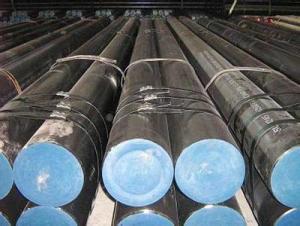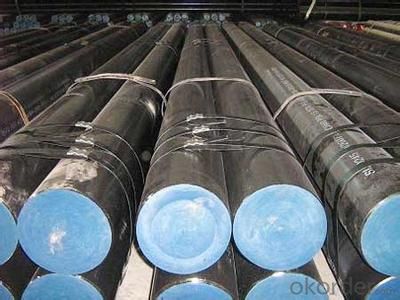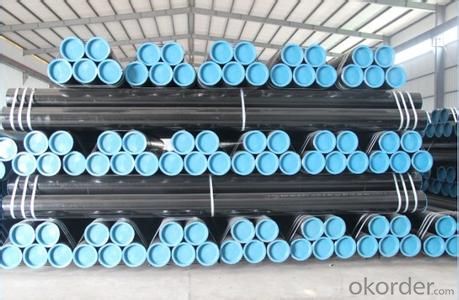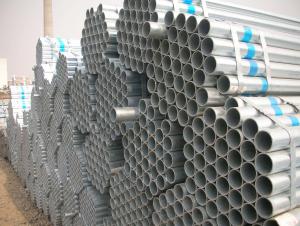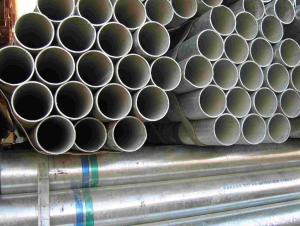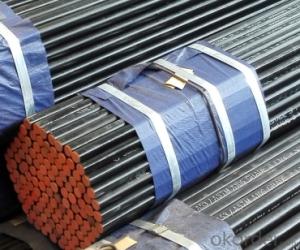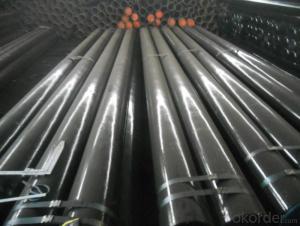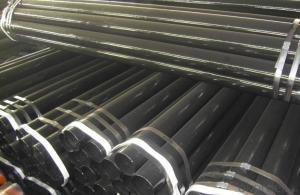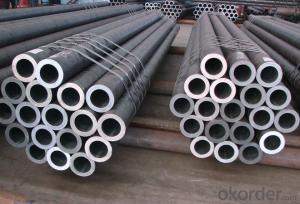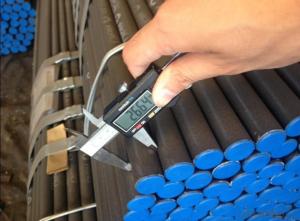Seamless Pipe 4 - 12“ API 5L A53 A106 GR.B 20#
- Loading Port:
- Shanghai
- Payment Terms:
- TT or LC
- Min Order Qty:
- 20 m.t.
- Supply Capability:
- 10000 m.t./month
OKorder Service Pledge
OKorder Financial Service
You Might Also Like
1、Structure of Seamless Pipe 4 - 12“ API 5L A53 A106 GR.B 20#
Seamless pipe is formed by drawing a solid billet over a piercing rod to create the hollow shell. As the manufacturing process does not include any welding, seamless pipes are perceived to be stronger and more reliable. Historically seamless pipe was regarded as withstanding pressure better than other types, and was often more easily available than welded pipe.
2、Main Features ofSeamless Pipe 4 - 12“ API 5L A53 A106 GR.B 20#
• Small inertia resistance
• Strong heat dissipation ability
• Good visual effect
• Reasonable price
• High manufacturing accuracy
• High strength
、
3、Seamless Pipe 4 - 12“ API 5L A53 A106 GR.B 20# Specification:
Standard | GB, DIN, ASTM ASTM A106-2006, ASTM A53-2007 |
Grade | 10#-45#, 16Mn 10#, 20#, 45#, 16Mn |
Thickness | 8 - 33 mm |
Section Shape | Round |
Outer Diameter | 133 - 219 mm |
Place of Origin | Shandong, China (Mainland) |
Secondary Or Not | Non-secondary |
Application | Hydraulic Pipe |
Technique | Cold Drawn |
Certification | API |
Surface Treatment | factory state or painted black |
Special Pipe | API Pipe |
Alloy Or Not | Non-alloy |
Length | 5-12M |
Outer Diameter | 21.3-610mm |
Grade | 20#, 45#, Q345, API J55, API K55, API L80, API N80, API P110, A53B |
Standard | ASME, ASTM |
1) Material:20#(ASTM A 106/A53 GRB.API5LGRB,GB),45#,16Mn,10#.
2) Specification range:OD:21.3-610mm,WT:6-70mm,length:6-12m or according to the requirement of clients.
3) Excutive standards:GB,ASME API5L.ASTM A 106/A53,Despite of the above standards,we can also supply seamless steel pipe with standard of DIN,JIS,and so on,and also develop new products according to the requirements of our clients!
4) Surface:black lacquered,varnish coating or galvanized.
5) Ends:Beveled or square cut,plastic capped,painted.
6) Packing:bundles wrapped with strong steel strip,seaworthy packing.
4、Packaging & Delivery
Packaging Details: | seaworthy package,bundles wrapped with strong steel strip |
Delivery Detail: | 15-30days after received 30%TT |
5、FAQ of Seamless Pipe 4 - 12“ API 5L A53 A106 GR.B 20#
①How is the quality of your products?
Our products are manufactured strictly according to national and internaional standard, and we take a test
on every pipe before delivered out. If you want see our quality certifications and all kinds of testing report, please just ask us for it.
Guaranteed: If products’ quality don’t accord to discription as we give or the promise before you place order, we promise 100% refund.
③Why should you chose us?
Chose happens because of quality, then price, We can give you both.Additionally, we can also offer professional products inquiry, products knowledge train(for agents), smooth goods delivery, exellent customer solution proposals.Our service formula: good quality+good price+good service=customer’s trust
SGS test is available, customer inspection before shipping is welcome, third party inspection is no problem.
6、Seamless Pipe 4 - 12“ API 5L A53 A106 GR.B 20# Images:
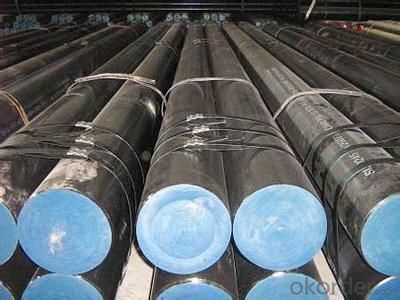
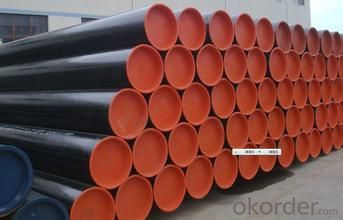
- Q: Are steel pipes affected by UV rays?
- Yes, steel pipes can be affected by UV rays. Exposure to UV rays can cause the steel to degrade and corrode over time. Therefore, it is important to protect steel pipes from direct sunlight and UV radiation to prolong their lifespan and maintain their structural integrity.
- Q: Can steel pipes be used for transporting liquids?
- Yes, steel pipes can be used for transporting liquids. Steel pipes are commonly used in various industries, including oil and gas, water supply, and sewage systems, due to their durability, strength, and resistance to corrosion. They are effective for transporting liquids such as water, oil, natural gas, and chemicals over long distances efficiently and safely.
- Q: What are the different methods of pressure testing steel pipes?
- There are several different methods of pressure testing steel pipes, including hydrostatic testing, pneumatic testing, and ultrasonic testing. Hydrostatic testing involves filling the pipe with water and pressurizing it to a specified level to check for leaks or weaknesses. Pneumatic testing is similar but uses compressed air or gas instead of water. Ultrasonic testing involves using high-frequency sound waves to detect any defects or flaws in the pipe. Each method has its own advantages and is chosen based on the specific requirements and industry standards.
- Q: How much is the wall thickness standard of building 48?
- Steel tube (Steel pipe) production technology development began in the bicycle manufacturing industry, the rise of the early nineteenth Century during the oil development, the two world war ships, boilers, aircraft manufacturing, manufacturing of power boiler after the Second World War, the development of chemical industry of petroleum and natural gas drilling and transportation, will effectively promote the the yield and quality of varieties, the development of steel tube industry.
- Q: How are steel pipes insulated to prevent freezing?
- Steel pipes are typically insulated using materials such as foam or fiberglass insulation, which are wrapped around the pipes. This insulation helps to prevent freezing by providing a barrier between the cold temperatures outside and the pipes, thus maintaining the necessary heat inside the pipes to prevent freezing.
- Q: What are the different methods of protecting steel pipes from external damage?
- There are several methods of protecting steel pipes from external damage, including coating the pipes with a corrosion-resistant material such as epoxy or polyethylene, applying a layer of protective tape, installing a cathodic protection system, using concrete or rock shielding, and implementing measures to prevent soil movement or impact damage.
- Q: Can steel pipes be used for underground fuel storage systems?
- Steel pipes are an excellent choice for underground fuel storage systems. Due to their strength, durability, and resistance to corrosion, they are widely used in this application. By opting for steel pipes, one can rely on a secure and long-lasting solution for underground fuel storage. These pipes are capable of withstanding the pressure and weight of the fuel, making them suitable for this purpose. Moreover, their easy weldability and interconnectivity provide flexibility in designing and constructing such systems. However, it is crucial to ensure that the steel pipes used in underground fuel storage systems are properly coated or lined to prevent corrosion and protect the fuel from contamination. Regular inspections and maintenance play a vital role in identifying and addressing any potential issues that may arise.
- Q: Can steel pipes handle extreme weather conditions?
- Yes, steel pipes are known for their ability to handle extreme weather conditions. Steel is a durable and strong material that can withstand harsh environmental elements, including extreme temperatures, high winds, heavy rainfall, and even extreme weather events like hurricanes and tornadoes. Steel pipes are commonly used in various industries and applications, such as water and sewage systems, oil and gas pipelines, and construction projects, precisely because of their resilience and ability to withstand extreme weather conditions. Additionally, steel pipes can be coated or treated to enhance their resistance to corrosion, further increasing their ability to handle extreme weather conditions.
- Q: How are steel pipes used in the construction of wind farms?
- Steel pipes are commonly used in the construction of wind farms to support and secure the wind turbines. These pipes serve as the foundation for the turbines, providing stability and structural integrity. They are used to create the tower structure, which supports the nacelle and rotor blades. Additionally, steel pipes are used for transporting and distributing the electrical cables within the wind farm, ensuring efficient transmission of electricity generated by the turbines.
- Q: Are steel pipes suitable for use in mining applications?
- Yes, steel pipes are suitable for use in mining applications. They are highly durable, resistant to corrosion, and can withstand high pressure and extreme temperatures often encountered in mining operations. Additionally, steel pipes have excellent structural integrity and can be easily welded, making them ideal for various mining activities such as transporting fluids, ventilation systems, and underground infrastructure.
Send your message to us
Seamless Pipe 4 - 12“ API 5L A53 A106 GR.B 20#
- Loading Port:
- Shanghai
- Payment Terms:
- TT or LC
- Min Order Qty:
- 20 m.t.
- Supply Capability:
- 10000 m.t./month
OKorder Service Pledge
OKorder Financial Service
Similar products
Hot products
Hot Searches
Related keywords
